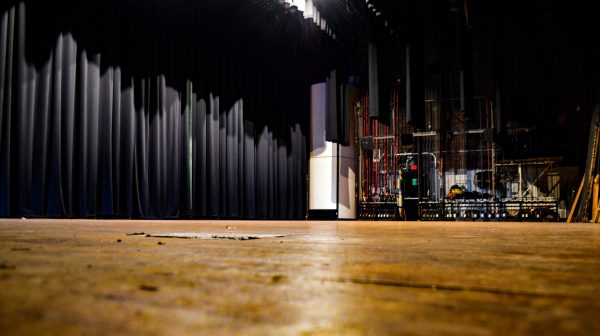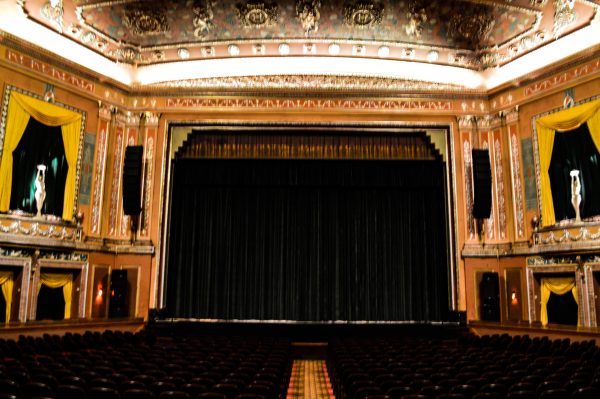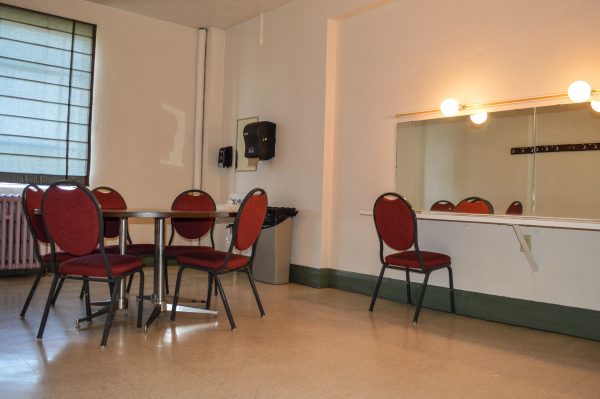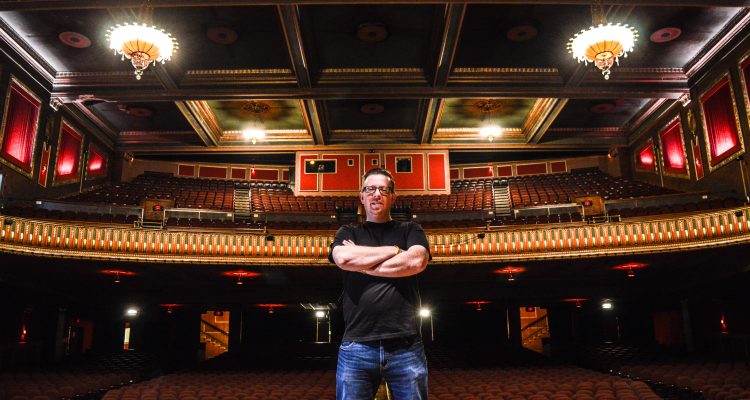“Tom Beck.”
Those were the first two words Kyle Knox blurted after being asked how he has found himself as the production manager of the Capitol Theatre.
Beck served as the venue’s production manager from 1991 until his retirement in September 2015, and after the Wheeling Convention and Visitors Bureau purchased the Capitol Theatre from Live Nation in April 2009, it was Beck who was charged with orchestrating the venue’s resurrection after it had been closed for a few years because of safety issues.
“At the time the purchase of the theatre was finalized, I’ll be honest; I didn’t even know how to turn on the lights in this grand old place,” revealed Frank O’Brien, executive director of the Wheeling CVB. “Without Tom Beck and all of his experience that spanned more than 20 years, we would have been in a lot of trouble. Thankfully, that wasn’t the case, and he was really extraordinary because his knowledge and skills really allowed us to make the improvements we had to make to the theatre once becoming the new owners. Tom was the main reason why we were able to do our first few shows. I know I certainly didn’t have the skill set.
“And we were really lucky when Tom decided to retire because Kyle was basically mentoring under him while with the Wheeling Symphony, so to have someone who had become so familiar with the ins and out of this theatre as well as possessing so many production abilities and skills learned on the job was terrific,” O’Brien said. “Kyle has been a really great hire for the theatre; that’s for sure.”
Knox began his career with the Greater Wheeling Sports and Entertainment Authority as a part-time usher at Wesbanco Arena in 2006, and then he became an events manager in 2013 after working with the Wheeling Symphony for two years as the organization’s customer relations and production manager. Knox, a 2013 graduate of West Liberty University, also has served as a production assistant for Jamboree in the Hills and the Heritage Music BluesFest.

He, too, is thankful for his time spent under Beck’s tutelage.
“My time working with Tom was invaluable to me,” Knox admitted. “I started as an usher at Wesbanco Arena when I was 16 years old, and then I got to start working with Tom in 2009; it was a phenomenal experience for me. I really can’t explain how much that man taught me about this building, and about production.
“He has so much knowledge, and he is someone who is very respected across this country; I can tell you that. To have someone like that on your side? I was a lucky person; that’s for sure,” he said. “I know the theatre has a lot of history, but the stories he would tell me made me realize there is so much more than probably anyone truly imagines.”
Like?
“Right before Tom was going to retire, Tom found these blueprints in the building from 1969,” Knox explained. “The blueprints were a design from when the owners were considering to make this a four-screen movie theatre. It would have been a multiplex.
“I had never imagined that was a possibility,” he continued. “But, after seeing the design, I could tell that the owners had really thought it out and were obviously considering it very seriously. Thankfully, the Jamboree shows finally returned to the Capitol Theatre, so the multiplex idea never panned out. It would have ruined this theatre.”
It is his house now, and Knox still is getting used to that fact. His parents often would take him to the historic theatre for Jamboree USA show during his childhood, and he clearly recalls his first event at Wesbanco Arena was ushering for a Nailers game, and his first show at the arena was Ronnie Milsap in 2006.

“I have always been a music nut, so to have the position I have now truly is a dream come true,” Knox said. “And to get to work in a place like this with so much history in entertainment? It’s really hard to describe that.
“The amount of history around here is palpable. You can feel it all the way around you,” he said. “Sure, there are times when it’s like any other job because you get frustrated and aggravated, but that’s when I remind myself about the history and what I get to do to make a living in my hometown. I didn’t have to leave like so many others, and for that I will always be thankful.”
A non-show work day for Knox usually begins between 8-9 a.m. and involves managing the theatre’s maintenance staff as well as continuing his preparations for the next scheduled show in an effort to make the extensive process progress as smoothly as possible. A show day, though, involves many more hours, and that’s exactly why there’s a cot in the production manager’s office.
“Show days always start very early for me because I like to get the jump on things just like Tom Beck used to, and that’s why I am here by 6 a.m. on those days,” Knox explained. “The first thing I usually do on those days is meet with the caterers so they can get breakfast ready for everyone. And that’s when the buses roll into town, and I meet them and bring them into the theatre so they can get acquainted with the space.
“Then we start the load-in and that process can vary depending on the kind of show we’re having here,” he explained. “Some shows may involve only a single box truck, but then there are others that have four of five semi-tractor trailers that need unloaded. When that’s the case, we usually have half of Main Street blocked while we’re trying to get them in here as quickly as possible.”

Meeting Jerry Seinfeld was a special day for Knox, especially since he grew up watching the superstar’s sitcom, and John Mellencamp proved a memorable experience when he appeared at the Capitol Theatre last year. The Avett Brothers have played in downtown Wheeling on two occasions, and the last time Knox prepared the basement’s best dressing room for the two brothers, who hail from Mount Pleasant, N.C.
They didn’t want it, though, and instead chose a smaller room with older furniture because of the better view of the Wheeling Suspension Bridge.
“Wheeling was once one of those cities that artists had to play, but that’s not the case anymore. That’s not why Seinfeld comes here or Mellancamp, or why the Avett Brothers returned that second time,” Knox explained. “The promoters and the bands will think about Pittsburgh, and they think about Columbus, but no longer do they have think about Wheeling, and we are not an in-house promoter. We are a rental house and that means promoters contact us, pay the fee, and then our support staff helps them to make sure everything takes place the way it needs to. For a lot of reasons, the finances are not in place for us to promote our own shows.
“Thankfully, what we have here that other secondary markets do not have is the history of this place, and especially in the country music industry artists want to play here because of that history,” he added. “They want to stand on that stage and become a part of what this is. We should be very thankful for that fact. I know I sure am.”
(Photos by Steve Novotney)



